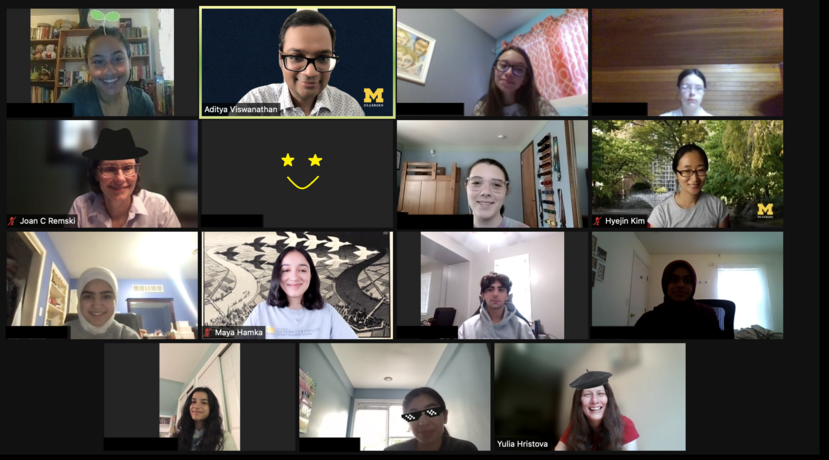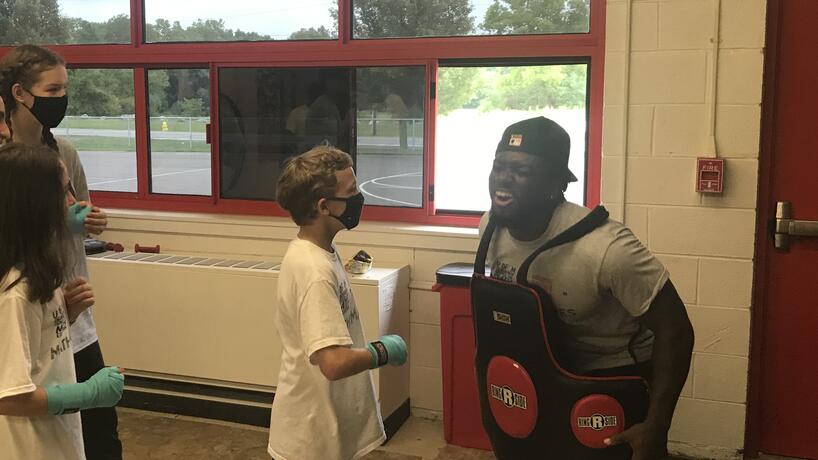
Mathematics Associate Professor Yulia Hristova started an outreach program to encourage women to enter science, technology, engineering and math fields. Associate Professor Yunus Zeytuncu created a math-centered sports-based workshop for kids at a local community center. And Assistant Professor Michael Dabkowski spent his summer teaching math through fun activities to children in underserved communities.
This is in addition to the work the Mathematics and Statistics department already does, like hosting a National Science Foundation-funded Research Experience for Undergraduates site on campus and running the math mentoring initiative Maize and Blue Math Circle, which is a problem-solving program for middle- and high-school students.
Mathematics and Statics Chair Joan Remski said the department’s community-minded culture has existed for many years. But faculty members became more strategic and collaborative in their approach recently, which has led to more grant awards and added outreach. “Our faculty aren’t just excellent researchers and grant writers — they are phenomenal teachers. That’s a magical combination.”
UM-Dearborn educators know how important it is to understand mathematics and they see the low standardized test scores in the subject — a problem further aggravated by the pandemic year. So they look for ways to work with community organizations and schools, Remski said.
“Mathematics is the secret to success in any STEM field and our professors want to go out and give students a strong foundation to build on.”
Professors started the summer GirlsGetMath@Dearborn program.

Over the past decade, Associate Professor Yulia Hristova detected a pattern in her math courses. The more advanced, the less women.
“It’s better than it used to be, but it’s still a concern,” she said. “In any field, if half the population doesn’t participate, you lose a lot. I wanted to find ways to reach girls at a young age, help them feel empowered and see that math leads to interesting career paths.”
Reading about Brown University’s GirlsGetMath@ICERM — a summer program that shows high school students the impact math applications have on our day-to-day lives — Hristova wanted to know more. So she attended a 2019 training on Brown’s campus about how to implement a similar program in Michigan.
This summer, Hristova and her colleagues made it happen. Metro Detroit high school students participated in the first GirlsGetMath@Dearborn summer camp, which took place online in July. Through the support of Elsevier's Mathematical Sciences Scholarship Fund, it was free for students to attend.
Four faculty members from Mathematics and Statistics led interactive lectures and computer labs: Hristova, Associate Professor Hyejin Kim, Assistant Professor Aditya Viswanathan and Remski. Student Maya Hamka, a senior majoring in Electrical Engineering and Engineering Mathematics and the UM-Dearborn chapter of Association for Women in Mathematics president, helped facilitate the computer labs and talked to participants about her college experience.
GirlsGetMath@Dearborn participants discussed graph theory and its applications to modeling epidemics, studied how recommendation systems — for example, what Netflix suggests to you — work, saw the role mathematics plays in image processing, and more. They also learned the programming language MATLAB, which is used by engineers and scientists to analyze data and develop algorithms.
“I want people to have a positive experience, to grow their confidence, to appreciate the beauty in mathematics and to see the positive change it brings forward.”
The program will continue in summer 2022.
Math Matches partners with Verizon, expands program.

Assistant Professor Michael Dabkowski said math is everywhere. To prove this point, UM-Dearborn faculty created the Math Matches program by merging two seemingly unrelated topics: boxing and math lessons.
So what’s the connection?
“There are patterns in boxing movements. Logic governs your next move. Physics comes into play: momentum and energy dissipation guide your decisions. Mathematical reasoning is definitely involved in boxing,” Dabkowski said. “It’s also active, fun and different. Our students loved the boxing activities; it garnered their attention and helped the daily math lesson saturate in a way that a more traditional math mentoring program might not.”
Associate Professor Yunus Zeytuncu, Mathematics Education Associate Professor Angela Krebs and Dabkowski helped develop the Match Matches program at the Jefferson-Barns Community Vitality Center’s Norwayne Boxing Gym in Westland in coordination with the gym’s Director Jan Mnich.
During the academic year, students meet on Saturdays to learn math and participate in physical education sessions; over the summer, they had the Math Matches summer day camp experience. Twenty students took part this summer.
Dabkowski said that it is easy to forget some of the mathematics that you learn in middle and high school, so students may arrive at college academically unprepared. Math Matches seeks to close the educational gaps that may exist. “No one is to blame. For whatever reason, some may view math as an abstract concept. Nothing could be further from the truth. Cooking, woodworking, balancing your budget or securing cryptocurrencies require mathematics. Students may never see these applications of mathematical ideas, so they lose interest. We hope to open their eyes.”
The program focuses on math lessons at the beginning of the day, along with collaborative activities, games and organized outside play. Later in the day, the participants reflect on what they’ve learned and head to the boxing gym. Math Matches, which includes healthy meals, is free for participants.
The unconventional approach and focus on increasing fluency in arithmetic, geometry and algebra in Metro Detroit communities caught the attention of Verizon Wireless. Looking to support pathways into STEM fields, Verizon is sponsoring the program with a $25,000 gift and future volunteer support.
"Verizon is proud to support the University of Michigan Dearborn's Math Matches Program. As a company, we have pledged to prepare 500,000 people for the jobs of the future by 2030 and this program is setting the critical framework for youth to excel in a fun and engaging way," said Verizon Community Engagement Director Brianna Ellison. The Community Foundation for Southeast Michigan also supports the program.
Dabkowski said as the program continues to grow, more students will sharpen their math skills while staying healthy and active in a safe community space.
Educators plan to bring a Math Corps site to campus.
From personal finance to cell phone data transmission to machine learning — and everything in between — mathematics permeates our daily life.
To help preteens and teens see how math is connected to so much of what we do, UM-Dearborn educators worked with nearly 60 Math Corps students over the summer.
The mission of Math Corps — which started in 1992 at Wayne State University and is now a nationwide initiative — is to empower and inspire children from under-served communities.
UM-Dearborn faculty members Dabkowski and Zeytuncu participated in the Ypsilanti Math Corp program, which was hosted by U-M and directed by Mathematics Arthur F. Thurnau Professor Sarah Koch.
Serving as a Ypsilanti Math Corp senior staff member, Dabkowski said he enjoyed the experience because teaching in Math Corps goes beyond math skills. It prioritizes mentorship through a kids-teaching-kids model, providing a positive learning environment and a strong sense of community.
“(Professor) Yunus (Zeytuncu) would teach the high school students. Then the high school students would go out and mentor the middle school students. It created an educational ecosystem.” Dabkowski ran an activities room where students exercised, played games and did a variety of math activities.
UM-Dearborn faculty have participated in Math Corps for multiple years and have done it in person and online. With the experiences gained, Zeytuncu and Dabkowski said UM-Dearborn plans to host a Math Corps site in 2022.
“We continue to ask ourselves: How can we better serve our communities? We are uniquely positioned between Detroit and Ypsilanti and know the need is there. Having a Math Corps site here will provide more opportunities for local students,” Dabkowski said. “We love when kids realize math is everywhere — it changes how they see it. It becomes useful, interesting and fun. That opens doors for learning.”
Article by Sarah Tuxbury. For more information about the Mathematics and Statistics Department’s community focused efforts, contact Chair Joan Remski.





